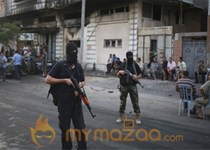Bitter enemies Israel and Hamas finally agree on something: If the growing presence of ISIS within Gaza is not contained, the terrorist group could touch off a repeat of the 50-day war that devastated the Palestinian territory last summer.
The black-clad jihadist group's tentacles have reached inside Gaza, and it has taken credit for a series of rocket attacks on Israel, as well as a coordinated series of car bombings on Sunday whose targets -- senior officials from Hamas and Islamic Jihad -- show ISIS in Gaza is at odds with fellow jihadists and infidels alike. Israel holds Hamas responsible for any and all attacks originating from the territory it controls, putting the onus on Hamas, itself a U.S.-recognized terrorist organization, responsible for putting the clamps on ISIS.
"Even if those who fired on Israel are rebel factions from world jihad organizations trying to challenge Hamas by firing on us, we still see Hamas as the responsible party for what happens in Gaza, and we will not suffer attempts to harm our citizens," said Defense Minister Moshe Ya'alon.
Hamas has been cracking down on Gazans who sympathize with hard-core Salafist organizations, including ISIS, which want the Islamist enclave to go back on the offensive against Israel. In recent weeks around 100 Salafists have been arrested by Hamas in Gaza. Sunday's car bombings, which a statement released by a group sympathetic to ISIS indicated may have been in retaliation for the arrests, were the latest in a string of violent incidents.
“The Salafists have decided to respond to these crimes and these blows dealt by Hamas by pointing rockets towards the occupation [Israel] and carrying out reprisals… The results will be catastrophic, will benefit no one, and it will be Hamas who shoulders the responsibility,” the statement read.
Holding Hamas responsible for actions by ISIS is complicated for Israel, because return fire at essential Hamas infrastructure would likely weaken the governing regime, jeopardizing the cease-fire, and strengthening their even more radical Islamist opponents. Hillel Frisch, an expert on Palestinian and Islamic politics at Israel’s Begin Sadat Center for Strategic Studies, said Israel understands this and speculated that there is more than a little "bluff and double bluff" going on in this complex Israel-Hamas relationship.
“Israel has been striking at ‘tin cans’ in retaliation; that’s what they’ve done so far,” Frisch told FoxNews.com. “They have not created any real damage. The name of the game between the two sides is basically that they will work together to maintain the cease-fire. The very fact that there are Salafists threatening to break the cease-fire shows to what extent Hamas is committed to it.
“Clearly, Hamas can’t prevent every missile launch, but it certainly can prevent most," he continued. "Israeli retaliatory strikes on Gaza are basically addressed at [calming] the Israeli population, demonstrating that the military is protecting them. It also signals to Hamas that they have attacked ‘tin cans’ and now it is Hamas’ job to deal with those carrying out the firing.”
While ISIS and other Salafists claim to have broad support in Gaza and elsewhere, recent indications suggest only 12 to 15 percent of the so-called "Arab street" backs them.
“ISIS, almost everywhere, does not command broad popular support,” Frisch said. “Most people in this part of the world, from Lebanon down to Egypt, are not extremist Salafist. They might be very religious, but they are not that extreme. Whenever I look at videos of ISIS parades, including in places such as Mosul, one ingredient is always missing – popular support. You don’t see big numbers participating in their parades.”







